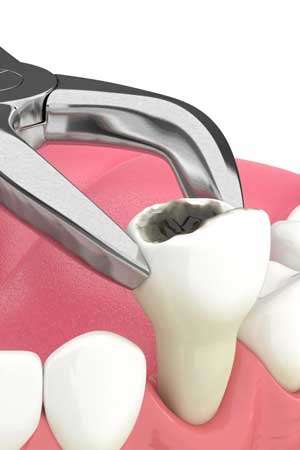Locations
Madhapur Plot No, 172, Rd Number 9, Ayyappa Society, Chanda Naik Nagar, Madhapur, Hyderabad, Telangana - 500072 Gayatri Nagar Plot no 298, beside sbi bank, Gayatri Nagar, Allapur, Borabanda, Hyderabad, Telangana - 500018 Miyapur H.no 1-258, opposite IndusInd bank, miyapur X Road, Miyapur, Hyderabad - 500049 Madhapur H.no: 2-56/23/15/5, ground floor, sainagar,madhapur, Hyderabad - 500081As many teens and some adults get their wisdom teeth removed, there are various other reasons for why tooth extraction might be necessary in adulthood.
When is tooth extraction suggested?
Doctor prefer to save natural teeth whenever possible. Yet, in some cases, other restorative techniques — like dental fillings or dental crowns — aren't sufficient. If your tooth has been severely damaged beyond the place of repair, removal might be vital. Your dentist might suggest tooth extraction if you have:
- Severe tooth decay.
- A fractured tooth.
- An impacted tooth.
- Crowded teeth.
- Severe gum illness.
- Tooth luxation or other dental injuries.
Tooth extraction is performed by a dental specialist or oral surgeon and is a quick outpatient procedure with either local, general, intravenous anesthesia, or a combination. Eliminating visible teeth is a simple extraction. Teeth that are broken, beneath the surface, or impacted require a more involved procedure.
What is tooth extraction procedure?
Tooth extraction will be either simple or surgical depending upon whether your tooth is visible or impacted.

Simple extraction
Local anesthesia is given to the patient, which numbs the region around your tooth so you will feel only pressure, not pain, during the procedure. The dentist then, uses an instrument known as elevator to loosen the tooth and forceps to eliminate it.
Surgical extraction
You will probably receive both local anesthesia and intravenous anesthesia, the latter of which makes you calm and relaxed. You may likewise get general sedation, depending upon any medical conditions. With general sedation, you will stay unconscious during the procedure.
The general dentist or oral surgeon will cut into your gum with a small cut. They might have to eliminate bone around your tooth or cut your tooth before it can be extracted.
Tooth extraction Aftercare
Here are some general guidelines for a speedy recovery:
- Keep the extraction site clean: Gently rinse the region with an antimicrobial mouthwash 2-3 times a day. Try not to brush directly over your extraction site until your dental specialist tells you it’s safe to do so. Brush and floss all the other areas normally.
- Take all medications as directed: Your dentist might prescribe antibiotics and pain relievers. It's essential to take all of these medications exactly as prescribed. You can likewise take over-the-counter pain relievers.
- Avoid strenuous activity for atleast 2 days. Heart rate that is elevated can cause increased post-operative bleeding and discomfort. Skip the gym for the initial 48 to 72 hours. Ask your dentist when it’s safe to resume normal routine.
What are the benefits of pulling a tooth?
Tooth extraction offers various advantages. In particular, it minimizes the harmful bacteria that damages your teeth and gums. Left untreated, a damaged or decayed tooth can wreak havoc on your smile, causing a domino effect of issues. Eliminating your impacted tooth allows you the best chance for ideal oral health. Moreover, a tooth extraction can assist with easing dental pain almost immediately — particularly if your tooth was severely broken or infected.
